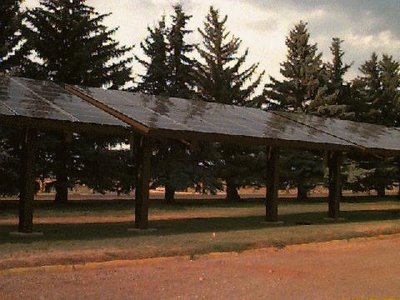One reason Steven and I want to have a super duper kitchen--besides the fact that we are now fortysomethings and have earned it--is that there is so much good material available here. We've both posted before about what a great thing our local farmer's market is, and how it is full of healthful, locally-grown, carefully-grown, and nutritious stuff. Plus, having JingXia in our lives right now, considering her formidable instincts surrounding food, warrants a very good laboratory for food prep. We've been composting for quite a while now, and though we didn't have a huge garden last summer because of the move here, in summers past we have grown quite a lot of stuff in our Atlanta garden.
Anyhow, i read this really great essay in the Times Sunday Magazine called Unhappy Meals about how our food supply, eating habits, and hence health, have all become terribly debased in the past 50 years or so, mostly with the advent of Agribusiness, bad science, aka "nutritionism," and, of course, fast food. I've been reading this book about the slow food movement called The End of Food, and i'm what you'd call "ripe" for hearing the messages the book delivers. Has anyone read that, or The Omnivore's Dilemma, which the author of the aforelinked essay also wrote?
Here's a compelling quote from the essay. It's worth the read, if you are concerned about what you eat:
"No one likes to admit that his or her best efforts at understanding and solving a problem have actually made the problem worse, but that’s exactly what has happened in the case of nutritionism. Scientists operating with the best of intentions, using the best tools at their disposal, have taught us to look at food in a way that has diminished our pleasure in eating it while doing little or nothing to improve our health. Perhaps what we need now is a broader, less reductive view of what food is, one that is at once more ecological and cultural. What would happen, for example, if we were to start thinking about food as less of a thing and more of a relationship?
In nature, that is of course precisely what eating has always been: relationships among species in what we call food chains, or webs, that reach all the way down to the soil. Species co-evolve with the other species they eat, and very often a relationship of interdependence develops: I’ll feed you if you spread around my genes. A gradual process of mutual adaptation transforms something like an apple or a squash into a nutritious and tasty food for a hungry animal. Over time and through trial and error, the plant becomes tastier (and often more conspicuous) in order to gratify the animal’s needs and desires, while the animal gradually acquires whatever digestive tools (enzymes, etc.) are needed to make optimal use of the plant. Similarly, cow’s milk did not start out as a nutritious food for humans; in fact, it made them sick until humans who lived around cows evolved the ability to digest lactose as adults. This development proved much to the advantage of both the milk drinkers and the cows."
1.31.2007
1.27.2007
Green Eggs & Ham


Look at that yummy chartreusey ceiling! I love that green. It really is close to Green Eggs and Ham green, and the red is not far off from the Cat's Hat. The green will continue down the walls to the rail at about 4', below that, the green will switch to another shade or two or three darker. The fake beams are in place, the star chandeliers are burning. I make my coffee in that red cabinet to the right of the fridge every morning. The cereal is in the cabinet to the left. Everything is still not totally done, but it is getting closer and closer everyday!
Today I hope to finally get to the duroc surface betwixt the upper and lower cabinets. And more tiny pieces of wood will be cut and nailed in place. I've already gone through 1.5 boxes of 1,000 1" finish nails. Yes, that's right boys and girls, 1,500 finish nails, so far... and i'm not even tallying the 2" finish nails, and even a few staple nails. Staggering. Literally.
Labels:
kitchen
1.25.2007
Red Hot and Cool
Just after snapping this photo just now of our cool fridge surrounded by hot hot hot, I realized our little special fresh Fluffy Butt lounging in the unmade bed (can't. be. bothered. KITCHEN.) represents the same tableau. She is to Stainless as Red 800 thread count cotton is to lacquer. Yes, I'm going crazy. CRAZY
I've dropped (accidentally of course) so many big heavy tools from up on high, I now realize--painfully--how a standard construction process would finish the floor LAST. We have so many dents and gouges in the floor now, i've started laughing each time the hammer falls again, or the air nailer, or god knows what. And since i am so intimately, obssessively acquainted with their locations and sizes, and relative effect to the whole, i'm thinking maybe i'll start naming them all. There's a triangular one i'll call Condi, a long, slight (inconsequential) one we could name George, and a big whopper that I will always spot FIRST every time i walk in the room. We'll call that one Dick.
Crazy. CRAZY i tell you.


I've dropped (accidentally of course) so many big heavy tools from up on high, I now realize--painfully--how a standard construction process would finish the floor LAST. We have so many dents and gouges in the floor now, i've started laughing each time the hammer falls again, or the air nailer, or god knows what. And since i am so intimately, obssessively acquainted with their locations and sizes, and relative effect to the whole, i'm thinking maybe i'll start naming them all. There's a triangular one i'll call Condi, a long, slight (inconsequential) one we could name George, and a big whopper that I will always spot FIRST every time i walk in the room. We'll call that one Dick.
Crazy. CRAZY i tell you.


Labels:
kitchen
1.24.2007
Let There Be Light :: Day Thirty-Two

 All the gobs of lighting are hooked up now, and everything is aglow. The 2 star chandeliers can't go in until the beams are placed, which can't go in until I paint the wood paneling at the ceiling (which is all finally in place now). We decided to do the 4 ceiling spaces on the diagonal... the hope was that it would be vaguely frenchey chevronesqueish, but in its unpainted state is looking more Ikea: 1976. I'm deep into getting all the tiny, nitpickey finish work done now, starting at the ceiling and working down. The soffit and ceiling are done and just about ready for paint. The hours just melt away as I do a little ADD dance, careening from outlets and wiring to ten thousand cuts for finish work to rerouting plumbing and electrical in the underneath to crying over the little hiccups. Today's hiccup: 12 glass shelves for the 3 tall china cabinets are like 1/16" too wide to fit. Honestly, after 32 days, this is the first challenge we've had that I can say is Ikea's problem and not mine. I'm going to try and find a shop in town tomorrow that can just grind two edges down a bit, but who knows how much that will cost. Or maybe i'll call Jada and see what she can do for me. Bruce told me there would be some inevitable problem with the order from Ikea, and i guess it has arrived.
All the gobs of lighting are hooked up now, and everything is aglow. The 2 star chandeliers can't go in until the beams are placed, which can't go in until I paint the wood paneling at the ceiling (which is all finally in place now). We decided to do the 4 ceiling spaces on the diagonal... the hope was that it would be vaguely frenchey chevronesqueish, but in its unpainted state is looking more Ikea: 1976. I'm deep into getting all the tiny, nitpickey finish work done now, starting at the ceiling and working down. The soffit and ceiling are done and just about ready for paint. The hours just melt away as I do a little ADD dance, careening from outlets and wiring to ten thousand cuts for finish work to rerouting plumbing and electrical in the underneath to crying over the little hiccups. Today's hiccup: 12 glass shelves for the 3 tall china cabinets are like 1/16" too wide to fit. Honestly, after 32 days, this is the first challenge we've had that I can say is Ikea's problem and not mine. I'm going to try and find a shop in town tomorrow that can just grind two edges down a bit, but who knows how much that will cost. Or maybe i'll call Jada and see what she can do for me. Bruce told me there would be some inevitable problem with the order from Ikea, and i guess it has arrived.
Labels:
kitchen
1.20.2007
1885 Ebonized Buffet
 We just bought this gorgeous buffet today. I've always wanted an aesthetic movement piece, and now I own one. I have some beautiful aesthetic silver from my Mom (from her grandparents?), that'll look great in these gallery shelves. Does anyone know anything about James Schoolbred? Apparently he was a somewhat famous maker of aesthetic movement pieces in London.
We just bought this gorgeous buffet today. I've always wanted an aesthetic movement piece, and now I own one. I have some beautiful aesthetic silver from my Mom (from her grandparents?), that'll look great in these gallery shelves. Does anyone know anything about James Schoolbred? Apparently he was a somewhat famous maker of aesthetic movement pieces in London. Hopefully we can go pick it up tomorrow: in Lynchburg, VA, about 300 miles from here. Should be an adventure, since snow is in the forecast!
1.19.2007
Denny Doherty, Nancy Sinatra, and the Surreal Sixties
Denny Doherty of The Mama's and the Papa's has passed away. As Homer pointed out rather recently, Denny was really "fricken cute." RIP Denny. I love all these surreal sixties videos from Hullabaloo:
Here he is, in the black vest; his solo is the "...stopped into a church, I passed along the way..." part:
I work with a young lady who is a graphic design student at OU, who looks sooo much like Michelle Phillips. Wonder if J can sing?
Here's some surreal Nancy Sinatra I randomly just saw on YouTube also. Everytime i hear this I imagine little Dawns and Tracys dancing around on sculpted green shag carpetting, doing all these crazy Nancy moves. Dig these dancers, would you! It looks like they have nothing on under those multi-colored chemises:
Ok last one, this is just too surreal not to post:
Here he is, in the black vest; his solo is the "...stopped into a church, I passed along the way..." part:
I work with a young lady who is a graphic design student at OU, who looks sooo much like Michelle Phillips. Wonder if J can sing?
Here's some surreal Nancy Sinatra I randomly just saw on YouTube also. Everytime i hear this I imagine little Dawns and Tracys dancing around on sculpted green shag carpetting, doing all these crazy Nancy moves. Dig these dancers, would you! It looks like they have nothing on under those multi-colored chemises:
Ok last one, this is just too surreal not to post:
Labels:
mind-numbing TV,
musicology
Newclipping of the Day :: It's Still About the Oil
This article does a good job of revealing the REAL reasons we are in Iraq, still:
"The Bush administration and U.S. oil companies (among others) are quite simply (and obscenely) taking advantage of an occupied, war-ravaged and internally divided nation to get control over as much oil as possible, and on the best possible terms. They are holding our troops—and the Iraqi people—hostage in order to get it. But, the removal of the PSAs makes clear that the extensive (although unreported) popular opposition and organizing in Iraq, the U.S., Britain and elsewhere against PSAs has succeeded, at least for now."
Here are 3 events--also noted in this article--happening very soon (tomorrow even) to follow in the news to find out more. I'm sure these will be all over CNN (NOT):
On January 20 and 21, people from around the country will are coming to Tacoma, Washington for the Citizens' Tribunal on the Legality of U.S. Action in Iraq. They are rallying in support of Lt. Ehren Watada, the first commissioned officer to refuse to fight in the war.
On January 23, the Senate Committee on Foreign Relations will hold a hearing to investigate "oil and reconstruction strategy in Iraq." This offers a critical opportunity to demand a cessation of all U.S. government and corporate influence over Iraqis as to the future of their oil.
Then, on January 27, we can join others from across the country taking to the streets of Washington, D.C. (and elsewhere) to demand the end to both the military and corporate occupations of Iraq
"The Bush administration and U.S. oil companies (among others) are quite simply (and obscenely) taking advantage of an occupied, war-ravaged and internally divided nation to get control over as much oil as possible, and on the best possible terms. They are holding our troops—and the Iraqi people—hostage in order to get it. But, the removal of the PSAs makes clear that the extensive (although unreported) popular opposition and organizing in Iraq, the U.S., Britain and elsewhere against PSAs has succeeded, at least for now."
Here are 3 events--also noted in this article--happening very soon (tomorrow even) to follow in the news to find out more. I'm sure these will be all over CNN (NOT):
On January 20 and 21, people from around the country will are coming to Tacoma, Washington for the Citizens' Tribunal on the Legality of U.S. Action in Iraq. They are rallying in support of Lt. Ehren Watada, the first commissioned officer to refuse to fight in the war.
On January 23, the Senate Committee on Foreign Relations will hold a hearing to investigate "oil and reconstruction strategy in Iraq." This offers a critical opportunity to demand a cessation of all U.S. government and corporate influence over Iraqis as to the future of their oil.
Then, on January 27, we can join others from across the country taking to the streets of Washington, D.C. (and elsewhere) to demand the end to both the military and corporate occupations of Iraq
Labels:
bush administration,
Iraq War,
politics in general
Glam Green!

While Steven and I are doing all this work to our house to bring it from 1925 to 2007, we would love to make the place more green. We'd be willing to spend 10% of all we are putting in, say $5k, on solar panels, a wind generator...anything that harnesses the power of the earth and uses it. But it is all so damned expensive, still. Five thousand will buy us nothing.
Announcement to the manufacturing demi-monde: I want affordable solar and wind collectors, NOT a flatscreen TV for less than $1k. Could you please offer that to me? I'll look out for your email.
Why can't feathering our nest be less sticks and mud, and more photovalics and silicon surfaces? Why does updating our house feel closer to 1925--at least in terms of technology--than to 2007?
I just read this report, and it really makes me wish we could do something. The US is so far behind in this area. Why are we so resistant to letting technology help us in this area? It seems every company offering tech here considers tech to be the latest ipod or gas-guzzling gadget machine, NOT improving the energy hogs that our nests still are. Look people, "the entire city of Reykjavik, Iceland, is powered by geothermal waters." Why can't we get away from coal and the fossil fuels? Why don't we realize what a huge growth area for business this could become?
Does anyone know if that Sharp system is available on the market? I just googled it and came up with nada, except for vague media plants like the article i'm referencing here. The article says the lowest installed cost is $31,500, which is too bad. It's a sad reflection of our culture that giant flatscreens can be had by the bundles of 30 vs. one tiny solar energy collector.
Do any of you have any green characteristics built into your homes?
Labels:
kitchen
1.16.2007
Loose Canon
Bush is a loose canon. He is dangerous, and increasingly desperate. He has no intention of suddenly embracing engagement or diplomacy. He has no intention of suddenly telling us why we are really in Iraq. He will move beyond Iraq, and he will do it in our name. He will use our money to do it. He will force his way no matter who tries to call bullshit on him, and laugh it off. He says even if only Laura and Barney support him, he will still plow ahead with whatever his secret agenda is. I have never seen democracy become such a joke.
I think i'm going to suggest to Wikipedia that Bush's picture be used to illustrate an entry defining Loose Canon. I am so frightened of what he is capable of doing over the next 2 years. He is so hostile to diplomacy and engagement. He is so keen to move outside of Iraq. And he'll do it all in our names and using our money. And we will be complicit, because we are not stopping him. Thanks Keith Olbermann, for doing what you can to stop him.
Labels:
bush administration,
Iraq War,
politics in general
1.15.2007
Kitchen Reconstruction :: Day Twenty-Three



Well, 23 days in and things are looking pretty good. We have ALOT of finish and detail work to do, but the basic nuts and bolts are there and in place. We need to get someone who knows about gas to come hook up the range and check for leaks. I will hook up the sink and DW myself, I can handle those. I think the DW must get blocking below or something so it doesn't look quite as short as it does in these pics. Time to read the installation manual!
 Now here's a pic of the corner of the sink and the stacked river rock we are planning to use as the backsplash, below the upper cabs and above all the countertop. What do y'all think? I think it will be very zen, especially when grazed with halogen lights from under the cabinets. The paper towel holder is there for reference: we are planning on a white carrera marble, similar to this thing, for all the horizontal counter surface.
Now here's a pic of the corner of the sink and the stacked river rock we are planning to use as the backsplash, below the upper cabs and above all the countertop. What do y'all think? I think it will be very zen, especially when grazed with halogen lights from under the cabinets. The paper towel holder is there for reference: we are planning on a white carrera marble, similar to this thing, for all the horizontal counter surface. We also considered doing carrera subway tile, lots of different varieties of mosaic and tiny glass tiles, but we like these stones the best. They certainly won't be the easiest to clean, given the extreme relief, but practicality has never guided our decisions too much. We also have some samples on the way that are more flat tiny river rocks, instead of these which are stacked and thus create lots of dimension and nooks and crannies. I have moved all our power receptacles up to the underside of the upper cabinets, where they will occur in a wood surface that turns into a plate rail running all the way around the space at approximately 48" above the floor. All receptacles and light switches will occur in this detail mould, rather than interupt beadboard paneling or the river rock.
Let us know what you all think of the stacked river rock... will show the other options when the last of the samples come in, and maybe we'll take a survey: that worked out well with the beadboard decision :) Whew. Off to bed.
Labels:
kitchen
1.14.2007
A Couple Days Hard Work
 We've gotten alot done in the past few days. Still not yet a usable kitchen, but alot is in place. The hood is all hooked up, the remote blower mounted to the side of the house, and the 17 feet of painstakingly installed and taped ductwork complete. The old sink is gone, as are ALL of the old cabinets now. The new Bosch fridge is in place, stocked, and in glorious use. And it was worth the money:
We've gotten alot done in the past few days. Still not yet a usable kitchen, but alot is in place. The hood is all hooked up, the remote blower mounted to the side of the house, and the 17 feet of painstakingly installed and taped ductwork complete. The old sink is gone, as are ALL of the old cabinets now. The new Bosch fridge is in place, stocked, and in glorious use. And it was worth the money: 1.) the ice cube dispensor does so in a polite, gentle fashion. Not 39 cubes in .5 seconds. And the cubes are dainty. Not big monstrous ones. This alone is worth a million bucks.
2.) it is SOOOOO quiet, we can hardly hear it running. Compared to ye olde whirlpool, now redeployed to the garage until we have a sale in the spring, it is super quiet. That thing sounds like a concrete mixer in comparison.
3.) it is *very* nice to dispense with the brita water filter pitcher. We now have filtered water through the door.
4.) gentle little bell chimes remind us that we've stood with the door open too long! Walt would have DIED to have had this circa 1975 or so! I can't tell you how often my dad was the wasting-energy-through-the-open-fridge-door police, a badge he proudly wears.
5.) digital readouts and gadgets galore. Well, i hope those have longevity and will still be working in 5 years. nuff said.

 Here is the start of the soffit framing which surrounds all the up high cabinets, and which hides the long duct from the exhaust hood. In the gaps between cabinets, paneling will infill for the most part, though in some of the gaps that are 12" or more, we will open it up and have finished niches for cookbooks, old milk bottles, Steven's teapot collection, etc. Lots of lighting up there.
Here is the start of the soffit framing which surrounds all the up high cabinets, and which hides the long duct from the exhaust hood. In the gaps between cabinets, paneling will infill for the most part, though in some of the gaps that are 12" or more, we will open it up and have finished niches for cookbooks, old milk bottles, Steven's teapot collection, etc. Lots of lighting up there.  Here are doors for those upper cabinets in the soffit. Lots of behind the scenes work has been done like this, doors all readied and hinged and hardwared and pulled, but we will wait to snap them in until the finish work is done, painting, etc.
Here are doors for those upper cabinets in the soffit. Lots of behind the scenes work has been done like this, doors all readied and hinged and hardwared and pulled, but we will wait to snap them in until the finish work is done, painting, etc.Steven spent alot of time today salvaging what we could of all the old cupboards; we'll refashion to create a plant-centric accommodation in the new greenhouse. Steven also got all the plants into the basement for a brief stay until construction on the greenhouse is done. Roof is to be redone on that and the skylights installed asap, weather permitting. They would come tomorrow, if only it would stop raining here. It's been rainy and a balmy 60 degrees for the past several days. Meanwhile, snow and ice in Dallas? Bizarro world.
Tomorrow, lots of jboxes get their locations tweaked, duroc goes up, all the upper cabs in, and then hopefully we'll get to locating the lower cabinets, sink, stove and dishwasher. It is an admittedly ambitious agenda for a holiday, But I think Martin Luther King would approve of the non violent evolution happening in our kitchen.
Labels:
kitchen
1.12.2007
1.10.2007
Bizarro World?
Remember the Seinfeld episode in which everything was exactly wrong? The parallel New York universe, but all was upside down? Well, reading a friend's blog, I just discovered Bill O'Lielly and Stephen Colbert will be doing a little *bizarro* world themselves. Check it.
Labels:
mind-numbing TV
1.07.2007
Moving Along... At the Pace of a Snail
 Well, we didn't get a whole heck of alot done this weekend, but a few of the way up glass doored cabinets are in place. You can see the start of the surrounding soffit here in this pic, above the two new pantry cabinets surrounding ye olde fridge. Not alot to see, but hopefully next weekend I will have 3 days to devote to the project. We'll see if I can get out of work on Friday.
Well, we didn't get a whole heck of alot done this weekend, but a few of the way up glass doored cabinets are in place. You can see the start of the surrounding soffit here in this pic, above the two new pantry cabinets surrounding ye olde fridge. Not alot to see, but hopefully next weekend I will have 3 days to devote to the project. We'll see if I can get out of work on Friday.
Labels:
kitchen
1.06.2007
Goodbye Old-Fashioned Hammer
Hello Air Nailer! We are ready to build that soffit and put up some panelling. Slow. At a *I-have-another-job* pace. It just didn't make sense for us to rent the air nailer again, when we could buy one. One that we'll use all over our hideous ground level, once we complete the kitchen on the Rez de Chausee. Au Revior. I have a Rendezvous with some wood. Here, the lovely Carol Merrel demonstrates the equipment


Labels:
kitchen
1.05.2007
Newsclipping of the Day: Bill Moyers' Narrative Imperative
Moyers has written another great essay that was first published a day or two ago in The Nation, but is also reprinted here from TomPaine.com. The piece is brilliant because it hits the nail on the head: Democrats need to think BIG, not just about their first 100 hours. How about 100 years? They have had plenty of time in the backseat for soul-searching and thinking and narrative writing. Now is the time to present a clear, lasting, and compelling alternative (We're All In This Together) to the Republican narrative (You're On Your Own). Nancy, Barack, Howard, Sherrod, you all need to take a page from the interpretive planning and exhibit design field and sit down and BRAINSTORM. Invite Bill Moyers. Craft the message and hone it, and deliver it in a compelling, memorable way that changes people's lives. Get it into think tanks and college campuses and K Street and Statehouses and County Commisions and the media and keep working on it. Let it evolve, change, grow over time, truly remaining and becoming something of the people. But for crissakes do it. You are in control of the agenda, not the other guys. Forget their narrative. You've got to do it now, because, as Moyers says:
"Everywhere you turn you'll find people who believe they have been written out of the story. Everywhere you turn there's a sense of insecurity grounded in a gnawing fear that freedom in America has come to mean the freedom of the rich to get richer even as millions of Americans are dumped from the Dream. So let me say what I think up front: The leaders and thinkers and activists who honestly tell that story and speak passionately of the moral and religious values it puts in play will be the first political generation since the New Deal to win power back for the people."
"Everywhere you turn you'll find people who believe they have been written out of the story. Everywhere you turn there's a sense of insecurity grounded in a gnawing fear that freedom in America has come to mean the freedom of the rich to get richer even as millions of Americans are dumped from the Dream. So let me say what I think up front: The leaders and thinkers and activists who honestly tell that story and speak passionately of the moral and religious values it puts in play will be the first political generation since the New Deal to win power back for the people."
1.04.2007
1.03.2007
Sacrifice.
Keith Olbermann, some might say, does tend to foam at the mouth sometimes. But boy does he have his finger on the pulse of us all. Thank goodness for the few pragmatists left among us with a voice. I hope every single Democrat in Congress sees this, especially YOU Hillary. Gee I can't wait for the State of the Union. And Nancy's response. Don't make me just say NO to NANCY, Nancy.
Labels:
bush administration,
Iraq War,
politics in general
1.02.2007
We Have Hood!

Boy was this a lot of work to hang and get hooked up. We still have to connect it to the remote blower, but hopefully that'll be cake compared to the other steps. I cut a gaping 13" diameter hole in the side of the house today for the blower, and it just freaked me out to do that. And then to hoist that 120 pound blower thingie up there, geez I'm glad Steven had gotten home from work by then and could help with that part, I couldn't have done that myself. It will be nice not to hear the motor roaring along at 1400 CFMs when you turn this baby on (that's the "remote" part).

Poor Gormie seems a little freaked by all the clanging and work going on. Steven's theory is that she's thinking "Oh shit, we're moving again?!" Poor little thing, she hid under the butcher block island squirreled away in the back bathroom most of the day today. Power tools and vacuum cleaners really rock her little world.
Labels:
kitchen
Subscribe to:
Comments (Atom)













